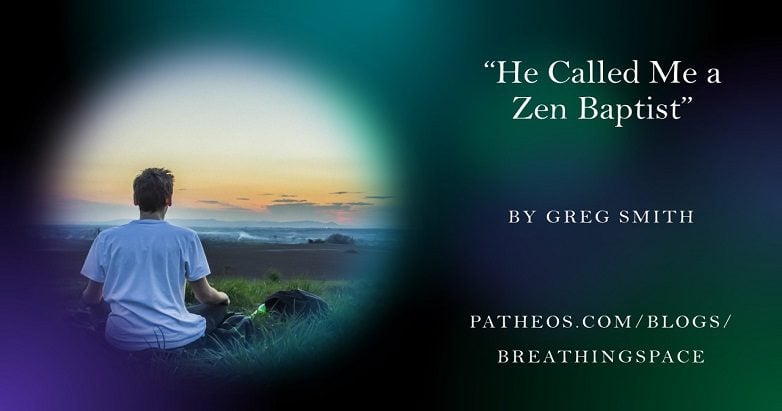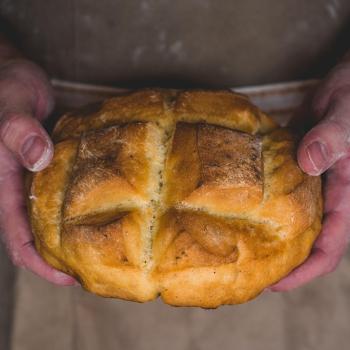When the 95-year-old Zen Buddhist monk Thích Nhất Hạnh passed away, I reflected on the influence Buddhism has had on my Christianity.

Zen Baptist
Years ago, a church member called and asked if I would help her with a university project. Her religion professor assigned each student to attend a service in a tradition other than their own. The parishioner expressed concerns about exposing herself to potentially harmful influences. She wanted to know if I could help her find someplace that would be “safe.” While I didn’t share her concern, I respected her desire to explore a different religion in an environment without pressure. So, I arranged a visit to our local zendo.
We arrived early and were greeted by a friendly monk in traditional robes. He escorted us into the meditation room—a large empty area with floor cushions around the perimeter. He invited us to sit cross-legged, and we joined him in zazen for twenty minutes. Afterwards, he was gracious enough to answer whatever questions she had and help her with her project.
We discussed the practice of zazen, the statuary that decorated the building, and the history of the Buddha. He explained the Four Noble Truths and the Eightfold Path. When she asked him what led him to become a Zen monk, he answered, “Oh, I used to be a Christian minister, but I found that my true path lay here.”
“I knew there was something familiar about you!” I said. Not that we had met before—but often a pastor can spot another pastor—something like gaydar.
“Yeah, you seem familiar too,” he said. “You’re a bit of a Zen Baptist, yourself!”
He wasn’t wrong. I took it as a great compliment (though my parishioner was aghast). My respect for Buddhism started long before that moment and would continue to this day.
Childhood Influences
Some of the first family friends I remember as a child were Asoka and Eileen. They were a South Asian Romeo and Juliet, forbidden to love each other by their Sinhalese and Tamil families. Bringing their Buddhism from Sri Lanka, they were happy to discuss their beliefs with their American friends. Visiting in their home reminded me of my mom’s decorating, because both houses were adorned with little Buddha figurines and Gautama paintings. Of course, those were the 1970s, when such things were in vogue.
My dad’s friendship with the Ganhewas impacted his later relationship with a young Thai foreign exchange student. Pak lived with members of our church for a year when I was a kid. His American “family” told him if he was going to live with them, he had to go to church. They wanted him to hear the Gospel and get saved. He respectfully attended, confiding in my parents that as soon as he graduated and returned to Thailand, he would enter a Buddhist monastery. Feeling compassion for his homesickness, my dad drove the two hours to the closest Buddhist temple, so Pack could practice his faith.
At some point in my teenage years, my mom became convinced that her decorations were idols. She is much more progressive these days, but this was the 1980s, at the height of the “satanic panic.” Evangelicals were terrified of eastern religions and the New Age Movement. In those days you could get a demon just like catching a cold. Visitors to our home must have commented about the Buddha doodads and told her that she was inviting evil spirits into the home. So, she got rid of every Gautama statue—all except the painting that she took off the wall but tucked behind the piano, where it stayed concealed for years.
Instead of a Demon…Peace
My college education in sociology and world religions eventually gave me an open mind that would embrace diversity and see the good in faithful people across the globe. At first, though, it frightened me, because I came from a small town and a country church that taught me to fear anything different. When I took a class in Zen Buddhism, I cringed at the assignment to sit zazen. The professor gave instructions in how to practice this basic form of meditation and told us to discuss our experience at the next class session. I remember nervously finding a spot beneath a tree in the local park, sitting cross-legged, softening my gaze, and breathing. I recall being surprised when instead of a demon, I found peace.
Since that time, I made meditation a regular part of my life. In addition to zazen, I studied and practiced mantra meditation, Tai Chi, Qigong, and other Eastern forms. I found these analogous to Lectio Divina, contemplative prayer, centering prayer, and similar Christian practices. Those who argue that Christians should refrain from meditation are afraid of the unknown. The practice has nothing to do with doctrines or psychedelic experiences. Just because something is from another religion, that doesn’t mean it’s bad. It’s been said that whatever is good belongs to me as a Christian. The goal of meditation is peace—which is, after all, a fruit of the Spirit.
You’ve heard that Buddhism is a philosophy, not a religion. Basically, this is true. Most Buddhists don’t believe in God. They also don’t worship Buddha as a deity, the way Christians pray to a divine Christ. Siddhartha Gautama was a prince who became enlightened through meditation. He taught what he learned: to overcome suffering through releasing ego and detaching from unhealthy desires. He encouraged right view, right intention, right speech, right action, right livelihood, right effort, right mindfulness, and right concentration. In this sense, it’s a philosophy. Buddhism’s view on the afterlife might qualify it as a religion, though. While some Christians may believe in the transmigration of souls, I do not. I do, however, owe a deep debt of gratitude to Buddhism. Especially Zen, which is more of a practice, like yoga—a practice that has inspired me as well as many other followers of Jesus.
Thích Nhất Hạnh’s Influence on Christianity
Known by his students as Tie or Tay (Vietnamese for “Teacher), Thích Nhất Hạnh has influenced many followers of Christ. Exiled from his home country, he became a social activist during the Vietnam War. His teachings on nonviolence inspired Dr. Martin Luther King, Jr, and the civil rights movement in the US. Tie founded Plum Village in France, inviting Christian monks like Thomas Merton to learn the practice of Zen meditation. When faith traditions share with one another, it’s a beautiful thing. Contemplative Christians grieve his passing and feel gratitude for a life such as his. If you are a Jesus-follower who is interested in meditation, I hope you’ll reject the fundamentalist lies about getting a demon from the practice of mindfulness. And I hope when your Buddhist friends talk about the Buddha Nature, you’ll find it quite similar to the mind of Christ.












